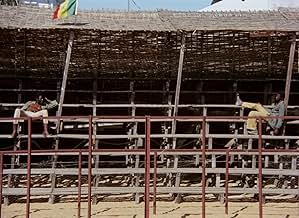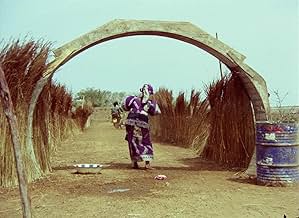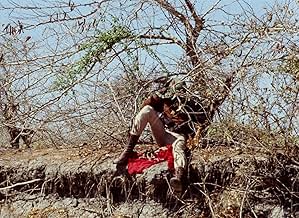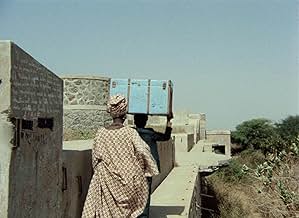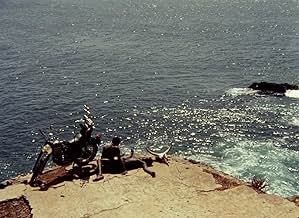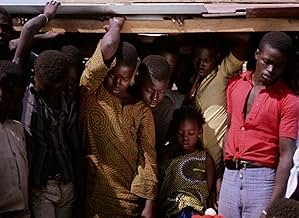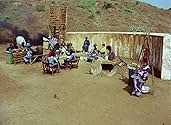IMDb RATING
7.0/10
4.4K
YOUR RATING
Mory, a cowherd, and Anta, a university student, try to make money in order to go to Paris and leave their boring past behind.Mory, a cowherd, and Anta, a university student, try to make money in order to go to Paris and leave their boring past behind.Mory, a cowherd, and Anta, a university student, try to make money in order to go to Paris and leave their boring past behind.
- Awards
- 2 wins & 1 nomination total
Myriam Niang
- Anta
- (as Mareme Niang)
Josephine Baker
- Joséphine Baker
- (voice)
- (as Joséphine Baker)
- Director
- Writer
- All cast & crew
- Production, box office & more at IMDbPro
Featured reviews
Finally tracked this 1973 film down after watching and enjoying "Hyenas" by the same director earlier this year. Purportedly, "Hyenas" was the sequel to this, but that might be more in an emotional sense, as this film is vibrant with youthful desire, especially desire to flee the motherland of Senegal, while in "Hyenas" a bewitching/besmirched woman returns to Senegal after decades of being abroad.
Youth is what drives "Touki Bouki" - a mismatched couple of Mory and Anta, full of big dreams lacking even the smallest details. Their crime spree is more innocent than Bonnie and Clyde, or Oliver Stone's "Natural Born Killers." But there is that sort of recklessness that propels them from scene to scene.
And there is youth behind the camera as well, although his brother talks about the director's scripting ability in the bonus scenes, much of the film has a raw improvised flair to it. Capture an animal being slaughtered, work in some three-card monte, dig up some gris-gris by the shore, include lots of street and road life, Tarzan in a tree and a wicked knife bearing crazy lady and a skull in a treasure chest.
Most of the crimes and dreams fall short, but finally a trip to an ocean-side pool leads to a clothes-make-the-man-and-woman fantasy flight for paradise. Or at least Paris, Paris, Paris (noticed the cast notes highlights Josephine Baker for her singing in this, she an emblem for fleeing an unappreciative if not hostile homeland ).
Are there elements here of class divide, of colonialism and racism, sure. Toss in some interesting angles on sex, Anta has a defiant androgeny that I bet captivated the director. She might make a modern-day heroine/hero for many. It's that youthful frustration with problems a budding adult senses have been around too long, but somehow s/he feels they can, they must overcome.
Yet even as you dream of the refined ocean liner outbound, you see the rotting husk of a ship offshore.
The plot is a tad thinner here than in "Hyenas" but what was interesting was the choice Mory makes at the end, granted a bit obfuscated by that strange Tarzan-esque interference.
Ultimately the film captured the intoxicating chaos of youth, while delivering a more subtle sobering statement about how one's own liberty is enmeshed in one's surroundings, even when those surroundings feel as though they conspire against one.
A dilemma, with horns.
Youth is what drives "Touki Bouki" - a mismatched couple of Mory and Anta, full of big dreams lacking even the smallest details. Their crime spree is more innocent than Bonnie and Clyde, or Oliver Stone's "Natural Born Killers." But there is that sort of recklessness that propels them from scene to scene.
And there is youth behind the camera as well, although his brother talks about the director's scripting ability in the bonus scenes, much of the film has a raw improvised flair to it. Capture an animal being slaughtered, work in some three-card monte, dig up some gris-gris by the shore, include lots of street and road life, Tarzan in a tree and a wicked knife bearing crazy lady and a skull in a treasure chest.
Most of the crimes and dreams fall short, but finally a trip to an ocean-side pool leads to a clothes-make-the-man-and-woman fantasy flight for paradise. Or at least Paris, Paris, Paris (noticed the cast notes highlights Josephine Baker for her singing in this, she an emblem for fleeing an unappreciative if not hostile homeland ).
Are there elements here of class divide, of colonialism and racism, sure. Toss in some interesting angles on sex, Anta has a defiant androgeny that I bet captivated the director. She might make a modern-day heroine/hero for many. It's that youthful frustration with problems a budding adult senses have been around too long, but somehow s/he feels they can, they must overcome.
Yet even as you dream of the refined ocean liner outbound, you see the rotting husk of a ship offshore.
The plot is a tad thinner here than in "Hyenas" but what was interesting was the choice Mory makes at the end, granted a bit obfuscated by that strange Tarzan-esque interference.
Ultimately the film captured the intoxicating chaos of youth, while delivering a more subtle sobering statement about how one's own liberty is enmeshed in one's surroundings, even when those surroundings feel as though they conspire against one.
A dilemma, with horns.
Two young people attempt to escape the poverty of their native Senegal and move to Paris. They raise some funds by committing petty crimes.
Touki Bouki is a very distinctive film that's for sure. The African continent hasn't been renowned for producing a great deal of important movies but this one certainly qualifies as such. It has a pretty basic story-line but it's not a plot-driven affair at all really. In actual fact it is quite experimental in approach much of the time and seems to have been influenced by the European New Wave films quite a bit. But what gives it its edge is that within that it is very specifically Senegalese. It's not often we see much from this part of the world represented in cinema, especially not from over forty years ago and certainly rarely from actual Senegalese film-makers. It's this Senegalese colour and authenticity, combined with the bold experimental cinematic presentation that makes this one very much stand out. In truth, I don't think I fully appreciated all its nuances on first viewing and would certainly like to return to it sometime in the future. Be warned though, it does contain some pretty brutal scenes of animal slaughter which make for difficult viewing. All-in-all though, this unusual film has a great deal of character and its strong sense of location makes for fascinating viewing.
Touki Bouki is a very distinctive film that's for sure. The African continent hasn't been renowned for producing a great deal of important movies but this one certainly qualifies as such. It has a pretty basic story-line but it's not a plot-driven affair at all really. In actual fact it is quite experimental in approach much of the time and seems to have been influenced by the European New Wave films quite a bit. But what gives it its edge is that within that it is very specifically Senegalese. It's not often we see much from this part of the world represented in cinema, especially not from over forty years ago and certainly rarely from actual Senegalese film-makers. It's this Senegalese colour and authenticity, combined with the bold experimental cinematic presentation that makes this one very much stand out. In truth, I don't think I fully appreciated all its nuances on first viewing and would certainly like to return to it sometime in the future. Be warned though, it does contain some pretty brutal scenes of animal slaughter which make for difficult viewing. All-in-all though, this unusual film has a great deal of character and its strong sense of location makes for fascinating viewing.
The story to this film is simple (maybe deceptively so), but it's told in an avant-garde way by Mambéty, and loaded with meaning. The premise is that a rebel and a university student have had enough of the traditional life in Dakar, and dream of escaping by ship to Paris. They get on his motorbike which is embellished with cow horns, and to the tune of Josephine Baker crooning "Paris, Paris," begin a series of misadventures on their way to the port.
The events that occur along the road trip, most involving theft or attempted theft, really aren't all that memorable, but the visuals that Mambéty and cinematographer Pap Samba Sow conjured up certainly were. Vibrant colors, rugged scenery, a photographer's eye for framing make for many gorgeous moments, pretty impressive for its limited budget. And yet, in stark contrast to the beauty in this land and its people, life is shown to be dirty, and a struggle. The film felt immersive into Senegal in a literal sense, but through its use of montages, fantasy, and misdirection, also immersive into the fractured mindset of its nonconformist protagonists.
Unfortunately, this immersion also includes some absolutely brutal scenes of animals being killed very early on - cattle in a slaughterhouse, as well as a goat out in a field. These go on for extended intervals, there is a lot of blood, and the animals are shown writhing in agony. Images from the slaughterhouse are reprised towards the end, giving it a larger point, that the young man is as trapped as those poor cows, which was a powerful moment, but I don't think the earlier scenes needed to have been as graphic as they were. It was nauseating to me, though admittedly my perspective is from a different culture, and one lucky enough to have the means to be vegetarian.
The film is made with artistry and style, but it's rooted in realism, and a reflection of the desire for a better life for the Senegalese. There isn't an overt argument made as to the devastating effects of colonialism that impoverished the country, but we do get a glimpse into the ugly attitudes of a French couple who have been teaching in Senegal for seven years, through this exchange:
"There's nothing to see in Senegal. Barren, intellectually as well." "Our salary is three times that of the Senegalese teachers, but they don't eat like we do. They're not as refined." "And what would we buy here? Masks? African art is a joke made up by journalists in need of copy."
Overall, despite its power and visual flair, I confess I admired this film more than I loved it. Aside from the animal slaughter (which may seriously turn you against the film on its own), the events on the road trip following that glorious scene on the flat rock with the sea churning below just weren't strong enough, and pacing was an issue. Worth seeing, just be prepared to avert your gaze in the beginning.
The events that occur along the road trip, most involving theft or attempted theft, really aren't all that memorable, but the visuals that Mambéty and cinematographer Pap Samba Sow conjured up certainly were. Vibrant colors, rugged scenery, a photographer's eye for framing make for many gorgeous moments, pretty impressive for its limited budget. And yet, in stark contrast to the beauty in this land and its people, life is shown to be dirty, and a struggle. The film felt immersive into Senegal in a literal sense, but through its use of montages, fantasy, and misdirection, also immersive into the fractured mindset of its nonconformist protagonists.
Unfortunately, this immersion also includes some absolutely brutal scenes of animals being killed very early on - cattle in a slaughterhouse, as well as a goat out in a field. These go on for extended intervals, there is a lot of blood, and the animals are shown writhing in agony. Images from the slaughterhouse are reprised towards the end, giving it a larger point, that the young man is as trapped as those poor cows, which was a powerful moment, but I don't think the earlier scenes needed to have been as graphic as they were. It was nauseating to me, though admittedly my perspective is from a different culture, and one lucky enough to have the means to be vegetarian.
The film is made with artistry and style, but it's rooted in realism, and a reflection of the desire for a better life for the Senegalese. There isn't an overt argument made as to the devastating effects of colonialism that impoverished the country, but we do get a glimpse into the ugly attitudes of a French couple who have been teaching in Senegal for seven years, through this exchange:
"There's nothing to see in Senegal. Barren, intellectually as well." "Our salary is three times that of the Senegalese teachers, but they don't eat like we do. They're not as refined." "And what would we buy here? Masks? African art is a joke made up by journalists in need of copy."
Overall, despite its power and visual flair, I confess I admired this film more than I loved it. Aside from the animal slaughter (which may seriously turn you against the film on its own), the events on the road trip following that glorious scene on the flat rock with the sea churning below just weren't strong enough, and pacing was an issue. Worth seeing, just be prepared to avert your gaze in the beginning.
Mory, a cowherd, and Anta, a university student, try to make money in order to go to Paris and leave their boring past behind.
This film looks great and is just very interesting from the whole clash of cultures perspective. You have some African tradition here, and mixed in with that you have some Muslim practices. I am no expert, but I suspect Islam in Senegal is much different than in the Middle East. It's an interesting blend. And then, of course, you have the modern world of France, which is different from either of those cultures.
What may strike viewers the most, especially because it happens so early in the film (and is repeated later), is the slaughter of the cattle. Whether the methods shown are humane or not, I have no idea. But they look brutal, and to the modern world it may be a shock to see something that has become so far removed from our everyday life. Now, food is food, and we rarely see that once upon a time it was a living thing.
This film looks great and is just very interesting from the whole clash of cultures perspective. You have some African tradition here, and mixed in with that you have some Muslim practices. I am no expert, but I suspect Islam in Senegal is much different than in the Middle East. It's an interesting blend. And then, of course, you have the modern world of France, which is different from either of those cultures.
What may strike viewers the most, especially because it happens so early in the film (and is repeated later), is the slaughter of the cattle. Whether the methods shown are humane or not, I have no idea. But they look brutal, and to the modern world it may be a shock to see something that has become so far removed from our everyday life. Now, food is food, and we rarely see that once upon a time it was a living thing.
An African film here about youth, about the thirst to escape from a place that parches it and the bike ride through dirt roads out to sea where a ship sails for Europe. But I want to avoid merely a museum visit or an aesthetic token from a faraway place, I want the heart that pounds behind appearances and gives rise to their breeze of color. What heart here?
First are the things he says about the home that is left behind. Symbolic cows being led to slaughter and cut to the young lead riding his motorbike with cow horns on the wheel. A stolen chest, supposedly full of money to pay for a DeGaulle statue but it contains a corpse.
These are the things the filmmaker knows exactly what he wants to say about. They're also the least interesting to watch for me. The young lead being wrestled by leftist students is intercut with cows being wrestled before the slaughter. The dear bike stolen by a savage white man and left broken while he's extracted with merely a broken leg. Not without nuance, but some of it is as didactic as we make fun of Hollywood.
More tantalizing is the journey through these to outrun them, even more so once you realize this is the same journey the filmmaker himself made from that same port. A yearning for freedom, but the desired freedom is a life of material comforts in Europe, what every boy his age would dream about, cafés and girls. Meanwhile the girl meekly tugs along behind her childish man. There's a sense that she quietly yearns for more; but she also feels beautiful in the (stolen) pink suit and red hat, as any girl would. I like films where youth is embraced with its dreams and folly, this is one.
But also a deeper heart, things which the filmmaker doesn't know how to express clearly but vaguely feels stirring. There are a few of these where the surface of the film is rippled by some hidden vortix that seems to rage in the deep, like when the girl thinks he has drowned. If the journey is Godard, this is Pasolini. This might be part of what some reviews note as sloppy technique. True. This is a man still trying to fathom how images can surround a feel.
So this is it here, a journey where as these two lovers flee, they get caught up in situations that tear from them images of who they are and what their surrounding world is like, images the air takes along which become the film. In the end one self is left behind, the one who has not outrun this world.
First are the things he says about the home that is left behind. Symbolic cows being led to slaughter and cut to the young lead riding his motorbike with cow horns on the wheel. A stolen chest, supposedly full of money to pay for a DeGaulle statue but it contains a corpse.
These are the things the filmmaker knows exactly what he wants to say about. They're also the least interesting to watch for me. The young lead being wrestled by leftist students is intercut with cows being wrestled before the slaughter. The dear bike stolen by a savage white man and left broken while he's extracted with merely a broken leg. Not without nuance, but some of it is as didactic as we make fun of Hollywood.
More tantalizing is the journey through these to outrun them, even more so once you realize this is the same journey the filmmaker himself made from that same port. A yearning for freedom, but the desired freedom is a life of material comforts in Europe, what every boy his age would dream about, cafés and girls. Meanwhile the girl meekly tugs along behind her childish man. There's a sense that she quietly yearns for more; but she also feels beautiful in the (stolen) pink suit and red hat, as any girl would. I like films where youth is embraced with its dreams and folly, this is one.
But also a deeper heart, things which the filmmaker doesn't know how to express clearly but vaguely feels stirring. There are a few of these where the surface of the film is rippled by some hidden vortix that seems to rage in the deep, like when the girl thinks he has drowned. If the journey is Godard, this is Pasolini. This might be part of what some reviews note as sloppy technique. True. This is a man still trying to fathom how images can surround a feel.
So this is it here, a journey where as these two lovers flee, they get caught up in situations that tear from them images of who they are and what their surrounding world is like, images the air takes along which become the film. In the end one self is left behind, the one who has not outrun this world.
Did you know
- TriviaThis film is believed to be Africa's first avant-garde film, although Soleil Ô (1970) could also make this claim.
- ConnectionsFeatured in Caméra d'Afrique (1983)
- SoundtracksParis, Paris, Paris
(Madrid) (uncredited)
Music by Agustín Lara
Spanish lyrics by Agustín Lara
French lyrics by Georges Tabet
Performed by Josephine Baker
- How long is Touki Bouki?Powered by Alexa
Details
- Release date
- Country of origin
- Languages
- Also known as
- Le voyage de la Hyène
- Filming locations
- Production companies
- See more company credits at IMDbPro
Box office
- Gross worldwide
- $180
- Runtime
- 1h 25m(85 min)
- Sound mix
- Aspect ratio
- 1.37 : 1
Contribute to this page
Suggest an edit or add missing content

